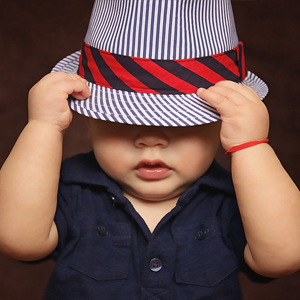Your Baby Outline
View Social/Emotional, Language/Communication, Cognitive (learning, thinking, problem-solving), & Movement/Physical Development
How your child plays, learns, speaks, acts, and moves offers important clues about your child’s development. Developmental milestones are things most children can do by a certain age.
Check the milestones your child has reached within the selected age. Take this with you and talk with your child’s doctor at every visit about the milestones your child has reached and what to expect next.
2 Months
What Babies Do At This Age:
Social/Emotional
- Begins to smile at people
- Can briefly calm himself (may bring hands to mouth and suck on hand)
- Tries to look at parent
Language/Communication
- Coos, makes gurgling sounds
- Turns head toward sounds
Cognitive (learning, thinking, problem-solving)
- Pays attention to faces
- Begins to follow things with eyes and recognize people at a distance
- Begins to act bored (cries, fussy) if activity doesn’t change
Movement/Physical Development
- Can hold head up and begins to push up when lying on tummy
- Makes smoother movements with arms and legs
Act Early By Talking To Your Child’s Doctor If Your Child:
- Doesn’t respond to loud sounds
- Doesn’t watch things as they move
- Doesn’t smile at people
- Doesn’t bring hands to mouth
- Can’t hold head up when pushing up when on tummy
Tell your child’s doctor or nurse if you notice any of these signs of possible developmental delay for this age, and talk with someone in your community who is familiar with services for young children in your area, such as your state’s public early intervention program. For more information, go to www.cdc.gov/concerned or call 1-800-CDC-INFO (1-800-232-4636).
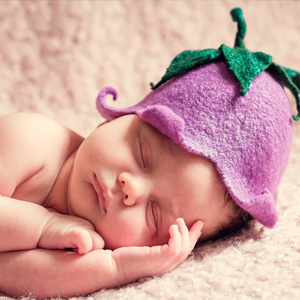
4 Months
What Babies Do At This Age:
Social/Emotional
- Smiles spontaneously, especially at people
- Likes to play with people and might cry when playing stops
- Copies some movement and facial expressions, like smiling or frowning
Language/Communication
- Begins to babble
- Babbles with expression and copies sounds he hears
- Cries in different ways to show hunger, pain, or being tire
Cognitive (learning, thinking, problem-solving)
- Lets you know if she is happy or sad
- Responds to affection
- Reaches for toy with one hand
- Uses hands and eyes together, such as seeing a toy and reaching for it
- Follows moving things with eyes from side to side
- Watches faces closely
- Recognizes familiar people and things at a distance
Movement/Physical Development
- Holds head steady, unsupported
- Pushes down on legs when feet are on a hard surface
- May be able to roll over from tummy to back
- Can hold a toy and shake it and swing at dangling toys
- Brings hands to mouth
- When lying on stomach, pushes up to elbows
Act Early By Talking To Your Child’s Doctor If Your Child:
- Doesn’t watch things as they move
- Doesn’t smile at people
- Can’t hold head steady
- Doesn’t coo or make sounds
- Doesn’t bring things to mouth
- Doesn’t push down with legs when feet are placed on a hard surface
- Has trouble moving one or both eyes in all directions
Tell your child’s doctor or nurse if you notice any of these signs of possible developmental delay for this age, and talk with someone in your community who is familiar with services for young children in your area, such as your state’s public early intervention program. For more information, go to www.cdc.gov/concerned or call 1-800-CDC-INFO (1-800-232-4636).
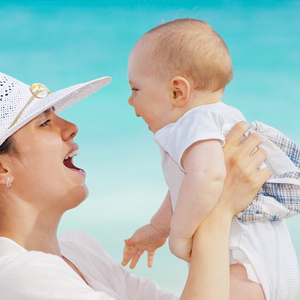
6 Months
What Babies Do At This Age:
Social/Emotional
- Knows familiar faces and begins to know if someone is a stranger
- Likes to play with others, especially parents
- Responds to other people’s emotions and ofter seems happy
- Likes to look at self in a mirror
Language/Communication
- Responds to sound by making sounds
- Strings vowels together when babbling (“ah”, “eh”,”oh”) and likes taking turns with parents while making sounds
- Responds to own name
- Makes sounds to show joy and displeasure
- Begins to say consonant sound (jabbering with”m,””b”)
Cognitive (learning, thinking, problem-solving)
- Looks around at things nearby
- Brings things to mouth
- Shows curiosity about things and tries to get things that are out of reach
- Begins to pass things from one hand to the other
Movement/Physical Development
- Rolls over in both directions (front to back, back to front)
- Begins to sit without support
- When standing, supports weight on legs and might bounce
- Rocks back and forth, sometimes crawling backward before moving forward
Act Early By Talking To Your Child’s Doctor If Your Child:
- Doesn’t try to get things that are in reach
- Shows no affection for caregivers
- Doesn’t respond to sounds around him
- Has difficulty getting things to mouth
- Doesn’t make vowel sounds (“ah”, “eh”, “oh”)
- Doesn’t roll over in either direction
- Doesn’t laugh or make squealing sounds
- Seems very stiff, with tight muscles
- Seems very floppy, like a rag doll
Tell your child’s doctor or nurse if you notice any of these signs of possible developmental delay for this age, and talk with someone in your community who is familiar with services for young children in your area, such as your state’s public early intervention program. For more information, go to www.cdc.gov/concerned or call 1-800-CDC-INFO (1-800-232-4636).
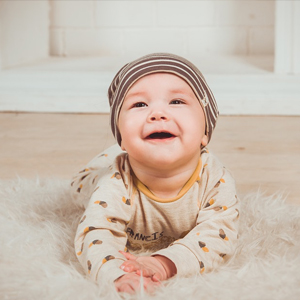
12 Months (1 Year)
What Babies Do At This Age:
Social/Emotional
- Is shy or nervous with strangers
- Cries when mom or dad leaves
- Has favorite things and people
- Shows fear in some situations
- Hands you a book when he wants to hear a story
- Repeats sounds or actions to get attention
- Puts out arm or leg to help with dressing
- Plays games such as “peek-a-boo” and “pat-a-cake”
Language/Communication
- Responds to simple spoken requests
- Uses simple gestures like shaking head “no” or waving “bye-bye”
- Makes sounds with changes in tone (sounds more like speech)
- Says “mama” and “dada” and exclamations like “uh-oh!”
- Tries to say words you sa
Cognitive (learning, thinking, problem-solving)
- Explores things in different ways, like shaking, banging, throwing
- Finds hidden things easily
- Looks at the right picture or thing when it’s named
- Copies gestures
- Starts to use things correctly; for example, drinks from a cup, brushes hair
- Puts things in a container, takes things out of a container
- Lets things go without help
- Pokes with index (pointer) finger
- Follows simple directions like “pick up the toy”
Movement/Physical Development
- Gets to sitting position without help
- Pulls up to stand, walks holding on to furniture (“cruising”)
- May take a few steps without holding on
- May stand alone
Act Early By Talking To Your Child’s Doctor If Your Child:
- Doesn’t crawl
- Can’t stand when supported
- Doesn’t search for things that she sees you hide
- Doesn’t say single words like “mama” or “dada”
- Doesn’t learn gestures like waving or shaking head
- Doesn’t point to things
- Loses skills he/she once had
Tell your child’s doctor or nurse if you notice any of these signs of possible developmental delay for this age, and talk with someone in your community who is familiar with services for young children in your area, such as your state’s public early intervention program. For more information, go to www.cdc.gov/concerned or call 1-800-CDC-INFO (1-800-232-4636).
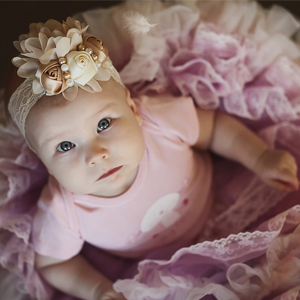
18 Months (1.5 Years)
What Babies Do At This Age:
Social/Emotional
- Likes to hand things to others as play
- May have temper tantrums
- May be afraid of strangers
- Shows affection to familiar people
- Plays simple pretend, such as feeding a doll
- May cling to caregivers in new situations
- Points to show others something interesting
- Explores alone but with parent close by
Language/Communication
- Says several single words
- Says and shakes head “no”
- Points to show someone what he wants
Cognitive (learning, thinking, problem-solving)
- Knows what ordinary things are; for example, telephone, brush, spoon
- Points to get the attention of others
- Shows interest in a doll or stuffed animal by pretending to feed
- Points to one body part
- Scribbles on his own
- Can follow 1-step verbal commands without any gestures; for example, sits when you say “sit down
Movement/Physical Development
- Walks alone
- May walk up steps and run
- Pulls toys while walking
- Can help undress herself
- Drinks from a cup
- Eats with a spoon
Act Early By Talking To Your Child’s Doctor If Your Child:
- Doesn’t point to show things to others
- Cant walk
- Doesn’t know what familiar things are for
- Doesn’t copy others
- Doesn’t gain new words
- Doesn’t have at least 6 words
- Doesn’t notice or mind when a caregiver leaves or returns
- Loses skills he/she once had
Tell your child’s doctor or nurse if you notice any of these signs of possible developmental delay for this age, and talk with someone in your community who is familiar with services for young children in your area, such as your state’s public early intervention program. For more information, go to www.cdc.gov/concerned or call 1-800-CDC-INFO (1-800-232-4636).
